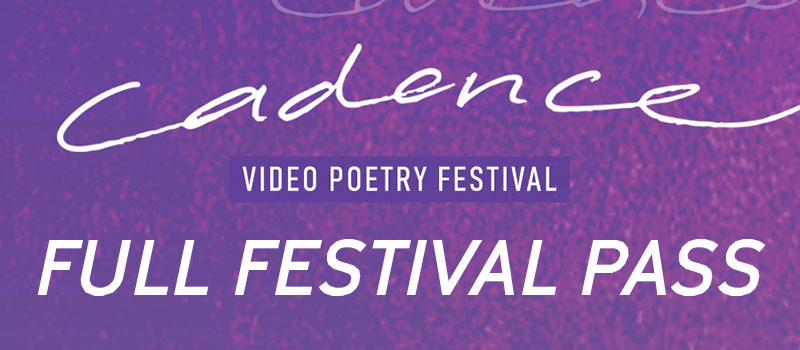Cadence 2019 – Full Cadence
Image credit, this page: Still from Cephalopod Meditation by Sierra Nelson
$12 General Admission
$9 Student/Senior
$7 Member
About
A selection of video poetry from the Cadence open call for entries in four categories: Adaptations/Ekphrasis (judged by Shawn Levy), Collaboration (judged by John Bresland), Video by Poets (judged by Sarah Minor), and Poetry by Video Artists (judged by Claudia Castro Luna). Judges within each of these categories will select a winning work that will be featured again at the closing screening on April 25.

SL/ABB/ED, by Adam Steiner

As We Embrace, by Amang Hung

Underground, by Beth Peloff + Dua Saleh

O Tired Love I am doing a tiptoe, by Brandon Jordan Brown

Pao Pae, by Bruno Quast

Ozark Crows, by Carolyn Guinzio

The Famous Whale, by Elizabeth Schiffler + Erin Lynch

Morning Routine, by Ellie Kozlowski + Jonah Kozlowski
This piece was born through a highly editorial collaboration between a filmmaker and poet. They identified a theme to explore, distilled that to a poetic visual motif, then re-expanded it to include words and sound. The result is deceptively simple, leaving room for the viewer to reflect on a complex shared experience of transformation.
Poet Bio:
Ellie Kozlowski is a writer and filmmaker living in Seattle. Her nonfiction guide book Best Tent Camping Washington was released in 2018. She is currently researching her next book, Washington Day Trips by Theme (forthcoming spring 2020). When she’s not scouting her next day trip, she’s writing poetry, jotting down film ideas, hanging out with her dog, or analyzing mountains of data.

Future Dispossessed, by fabian romero

Plasticpoems, by Fiona Tinwei Lam

Semechki, by Greg Budanov

For the Birds, by Hanna-Mari Ojala

The Opened Field, by Helmie Stil

Being and being empty, by Jane Glennie

Lulu's Journal, by Jose Luis Benavides

23 Lëtzebuerger Jongen, by Julian Weinert

Misery, by Marie Craven + Sarah Sloat

Poem for Rent, by Marie Craven

The Sine Wave, by Neely Goniodsky

Collapsing, by Non Films

light cycle, by Peter Berkley
“Light Cycle” is a short poem expressed through multimedia. It doubles as a gentle sensory bath and guided meditation using nature’s patterns, colors, and sounds.
Director Bio:
Peter Berkley is a multimedia visual artist whose work has been published and produced in the forms of music videos, short films, album covers, poster art, video art, and paintings.

Contronym, by Shaun Kardinal
video poem with collaged sculptures spinning in space and collaged dada-esque phrases ruminating on duality.
Director Bio:
Shaun Kardinal (b 1982) is a conceptual artist and curator creating form with ephemeral repetition. His current multi-year, evolving exhibition Forward launched in May 2017 from the foundation of his 2015–16 iterative curatorial project Turn. Using alteration, conglomeration, and curation, his cross-disciplinary practice manifests as modular structures, collaborative platforms, web-exclusive exhibitions, and interactive physical-digital installations. See Part 3 of Forward at Glassbox in August.

Cephalopod Meditation, by Sierra Nelson
Slide projector poem with words by Sierra Nelson (poet and Cephalopod Appreciation Society founder) accompanying images borrowed from the collection of Roland C. Anderson (1947-2014, Seattle Aquarium octopus expert and co-author of Octopus: The Ocean’s Intelligent Invertebrate).

Song for Hellos & Goodbyes, by Tommy Becker

Hiatus, by Vivian Ostrovsky
Video poetry is language as light. As an art form, video poetry is lucid and liminal—on the threshold of the literary and the moving image. It articulates the poetic image visually, rather than metaphorically—it shifts words from page to screen, from ink to light. A video poem makes meaning that would not exist if text was without image, image without text. It is language-based video work or a video-based poem. Video poetry is a literary genre presented as visual media.
Registration for both the adult and youth generative video poetry workshops is now open and festival passes to attend all four screenings are available.
See it all! $23 Members, $40 General

Thank you to The Evergrey for their support of Cadence: Video Poetry Festival as a Media Partner!

